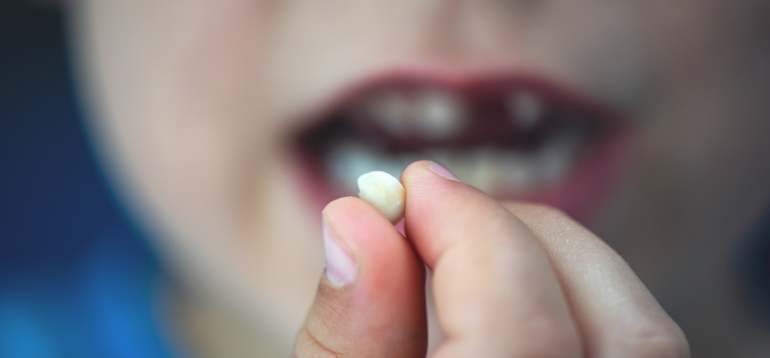Why to care for milk teeth when they are going to fall off?
Babies are a treasure for their parents and the treasure for the babies is their new set of milk teeth.
This is not an easy phase as babies graduate to toddlers and start erupting teeth. The tiny slivers as they erupt is a painful phase and known as the teething phase. It might go on for a year or more as a discomforting and painful phase, marked by higher-than-normal temperature and irritable babies.
Teething is a landmark pace that sets the foundation for teeth, our companions for life. However, as we all know that we develop a set of milk teeth and they fall by the age of six, and then we develop permanent ones.
If we all know that our baby’s milk teeth will fall with age, why should we care for them?
Milk teeth are irritable and painful when they erupt, however, our gums are more prone and compatible by the time our permanent teeth emerge.
Looking for dental treatment for kids in Nerul, call us for an easy appointment.
Some of the challenges with maintaining milk teeth-
- Milk teeth are very delicate and small and therefore difficult to clean and maintain.
- Babies and kids cannot brush and maintain on their own as much as when they are six years old.
- Milk teeth emerge over a period of one year and the gums are sore all the time. Taking care of random teeth between the gaps is a difficult task and needs more attention.
- The right eruption and fall of the milk teeth are important as it sets the alignment for the permanent ones.
Having known the importance of milk teeth in the primitive child years you should know, how they can be cared for.
- First and foremost identify a soft-bristled baby brush with a small head and a long handle.
- Choose a kids’ toothpaste or a Fluoride toothpaste as recommended by a dentist.
- Guide your child with the right amount of toothpaste.
- Before showing them how they can brush their teeth, it is important you do it for them.
- It might take a couple of years till they have a firm grip on the brush and are able to make circular or to-and-fro brush movements.
- Make brushing a fun and joyful activity.
- Educate children on oral care by showing them picture books on oral care.
- Keep on the lookout for stains, pits or decay and get it checked by a children’s dentist.
- Sugary and starchy substances should be avoided totally, or a generous tooth clean-up should be instilled as a habit post eating.
- Thumb sucking or sipper habits should be refrained or waned off as they might change the alignment of the teeth.
- Children would avoid brushing or rinsing procedure but stand beside them and supervise if they are doing right.
Your dentist would also recommend a Fluoride treatment for your child’s teeth. Fluoride prevents tooth decay by strengthening the teeth against acid attacks from plaque and sugar. Fluoride is a mineral present in nature and beneficial to teeth in many ways. Fluoride application in the dental office helps in prevention of milk teeth cavities. It serves as a vaccination against cavities for milk teeth without the fear of being injected. It is available in various forms like gels, varnishes and also present in various filing cements. Its gel is applied on the tooth carefully by a dentist every 3-6 months depending upon the child’s need. It is quite effective in lowering the risk of developing cavities or caries by upto 70% in children.
Caring for the milk teeth is extremely important as they are the ones which set a guidance for the permanent teeth to erupt. If milk teeth get cavities early then permanent teeth also get infected and either they may not erupt in the mouth at all or erupt at the wrong position and angle which then needs extensive braces treatment to correct.
Healthy Milk teeth help the child’s jaws to grow properly, if the milk teeth have to be removed due to cavities at a young age then jaw growth will not be proper and require cumbersome appliances to be made to correct growth of the jaws.
Milk teeth play an important role in determining the facial features of a child. Infected and decayed milk teeth distort the facial appearance due to swelling and lead to embarrassment for the child at the school.
Milk teeth turn black when they get a cavity and tei can be a reason for loss of confidence and stage fear for a child at school and social gatherings.
As parents, you can think of how you can make brushing a meaningful activity and not an enforced one.
A child’s smile is most precious, and it can be well guarded by keeping the teeth clean. Milk teeth will eventually fall as the child reaches the age of six. Make sure you monitor the new and permanent teeth coming and if they are aligned.
Make tooth care and tooth preserving important to them through stories.
Make a habit of keeping fallen teeth to be kept as a treasure in boxes, something that your kids can grow up and be amazed at.
Lastly, eating and drinking right, as well as brushing and rinsing each time after food, will continue to be a lifetime habit if instilled in the formative years of a child.
We practice painless kids dentistry at seawood and offer total dental care under one roof.


